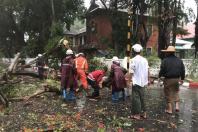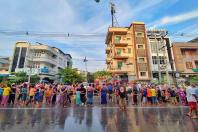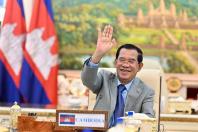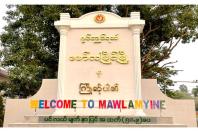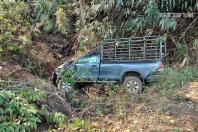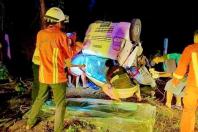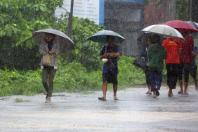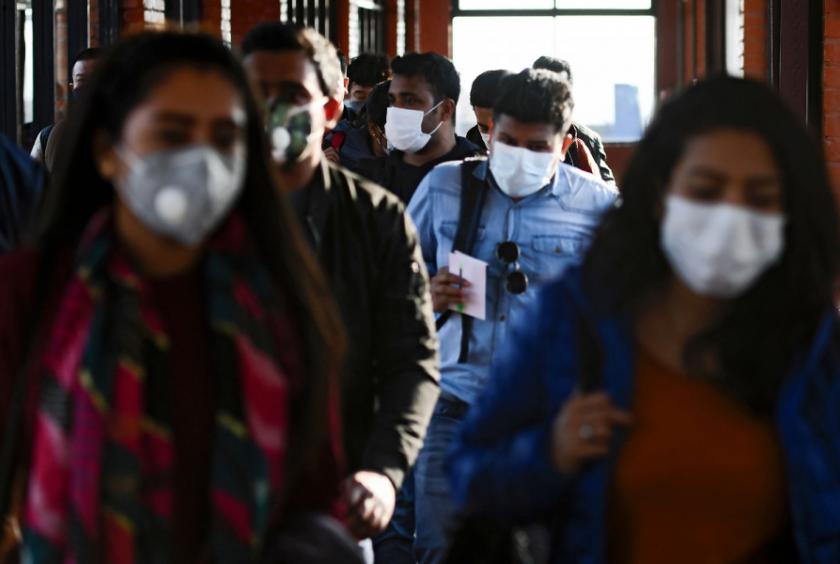
The Kathmandu Post / ANN
At least 177 Nepali students and workers from the Chinese province have asked for evacuation, according to the Nepali Embassy in Beijing.
Panic has set in among Nepali students and workers in the Chinese city of Wuhan and the greater Hubei province with the death toll from the coronavirus outbreak rising to 132.
At least 177 Nepali students and workers living in Hubei Province, including Wuhan, have asked the Nepali Embassy in Beijing to evacuate them, officials at the embassy told the Post.
“As of Tuesday, we had received very few requests for evacuation but by Wednesday evening, we had received requests from 177 Nepali students and employees living and working in Hubei Province and Wuhan to evacuate them due to the rise in deaths and family pressure from Nepal,” Sushil Lamsal, deputy chief of mission at the Nepali Embassy in Beijing, told the Post over the phone.
Several nations, like the United States, Japan, Australia and India, have already started evacuating their citizens from Wuhan and its surrounding cities which are on lockdown to stop the spread of the deadly virus.
Nepali Ambassador to China Leela Mani Poudyal has made a specific request to the Chinese Foreign Ministry regarding the safety and well-being of Nepali citizens living in Hubei Province and has discussed the need for evacuation, according to the Nepali Embassy in Beijing.
Nepali officials in Kathmandu and Beijing, however, are in a fix over how to evacuate the Nepalis, as they are scattered across Hubei Province, much of which is under lockdown.
Chinese authorities have turned down Nepal’s request for Nepalis taking commercial flights to return to Nepal due to fears of spreading the virus, said embassy officials. They have insisted that Nepali officials manage a sophisticated chartered flight out of Wuhan and place the evacuated Nepalis in isolation upon their return to Nepal for at least two weeks.
The Nepali Embassy in Beijing has in turn asked Chinese officials to ensure that all necessary amenities like food, water and medicines are available for Nepalis in Hubei and has said that it will provide a mental health professional to counsel any Nepali in distress.
Pramila Devkota, a Nepali student from Wuhan, told the Post that despite a request for evacuation, Nepali authorities were treating them as if they had already contracted the virus.
“If we were infected with the virus, the Chinese authorities would’ve admitted us into the hospital,” Devkota told the Post over the phone. “Concerned officials in Nepal and our diplomatic mission in Beijing seem to be afraid that we might spread the virus to Nepal, which is not prepared to handle the situation. But we are healthy and we want to come home.”
Devkota said that Nepalis were increasingly panicking, as they were afraid of going to the market or even leaving their rooms. Out of 150 students in Wuhan, only about 50 remain as most have returned to Nepal or have moved elsewhere in China, she said.
Lamsal, the deputy chief of mission, said that they had requested Chinese officials to allow Nepalis to return via a regular commercial flight but Chinese officials have denied the request.
The Chinese authorities have also attempted to convince Nepali officials that since the World Health Organisation is satisfied with the measures taken by China to control the virus, there was no need to worry. China had made a similar argument when Thai authorities had requested the evacuation of Thai citizens. The Thai Foreign Ministry said that “China is confident it can look after the students and workers trapped inside the Wuhan exclusionary zone.”
The UN health agency, which last week stopped short of calling the outbreak a public health emergency of international concern, on Monday, however, admitted making an error in originally assessing the virus' worldwide threat as "moderate". Issuing an update late Sunday, the WHO said the risk was actually "high at the global level".
According to Nepali officials, chartering a flight is not a problem but the difficulty comes in terms of logistics and precautions amidst a deadly virus outbreak and a quarantine that has essentially locked down 50 million people.
According to Nepali officials in Kathmandu and Beijing, they need to first bring together all Nepalis living and working in Hubei province with full safety measures. They need to be brought to one place while ensuring that they are fit to travel and have protective gear. Then, a medical checkup will need to be conducted in three different phases at the airport, with all passengers placed in isolation until they board the chartered flight, which needs to be fully equipped with medical facilities.
“Once the returnees land in Nepal, we require a proper quarantine facility at the airport to keep these people so that they will not spread the virus to others, if they have it,” said Lamsal. “They cannot be let out for at least two weeks because the incubation period for the virus is around 15 days.”
China has told Nepali officials that it will take at least 15 days to reopen the cities that are currently under lockdown, and according to the Chinese media, it will take at least another month to take full control of the viral outbreak.
“We have communicated the agony and concerns expressed by Nepali students to Kathmandu. The Health Ministry is assessing the situation and, accordingly, we will arrange for their evacuation,” said Lamsal.
While Nepal is attempting to evacuate its citizens out of China, entry of Chinese tourists has been prohibited at the Tatopani and Rasuwagadhi border points, effective from Wednesday, according to the Ministry of Home Affairs.
Home Ministry spokesperson Kedarnath Sharma told the Post that the movement of people is restricted from Tatopani and Rasuwagdhi for 15 days.
“Since the road connecting the Chinese side is cracked and there is a festive holiday in Tibet, there will be fewer people crossing the border,” he said. “But for Nepalis, a thorough medical check will be conducted at the border before they are allowed to enter.”
Southwest China's Tibet Autonomous Region meanwhile launched Level I emergency response to coronavirus outbreak on Wednesday, according to China Global Television Network. “Tibet is the only provincial region that has not reported any confirmed coronavirus cases in China. So far, only a suspected case has appeared in the region,” said the network.
There are currently no restrictions on Chinese flights coming in from China but the number of travellers has decreased significantly, according to officials.
“No Chinese flights come into Nepal from Hubei so there is no need to suspend flights from China at least for now,” said a senior official at the Ministry of Tourism and Civil Aviation. “But if the situation worsens, we might have to consider such measures.”

